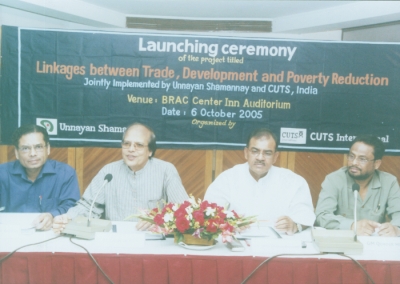Diversified non-RMG goods needed to increase exports
Speakers say
Star Business Report
Diversification of non-RMG products is needed, as Bangladesh has failed to up its exports of non-apparel items in the post-MFA regime, speakers observed at a project launching ceremony in Dhaka yesterday. They said in the trade liberalisation era, the dismal performance of non-RMG sectors seems to suggest that trade reform measures have not been successful for the country. They were speaking at the launch of a project titled 'Linkage between Trade, Development and Poverty Reduction', which will be implemented by Unnayan Shamannay, a local NGO, and CUTS, India in the next two years in Bangladesh. The main feature of the proposed research is that it will point out a number of trade liberalisation issues that are hindering formation of a pro-poor trade policy, the speakers said. They said the countries that liberalised their trading system quickly without any domestic maintenance mechanism would not be able to harvest as much benefits as they expected. After 1982, Bangladesh took up more than three trade liberalisation measures as per the World Bank and International Monetary Fund suggestions. But there was no strategy to reduce poverty in terms of trade liberalisation, they added. The speakers also said a caucus of political representatives should have been formed for accelerating the export of non-RMG goods. MA Razzaque of Economics Department of Dhaka University presented a keynote paper on 'Trade, Development and Poverty Reduction: Bangladesh Perspective'. Razzaque said exports from Bangladesh increased from $1.5 billion in 1990 to $8.6 billion in 2005. He said, "If only value addition is considered, the share of export in GDP increased from 4.4 percent in 1990 to about 8 percent in 2004. Apart from RMG, the response of other export items has been very weak, only around one percent," he added. The impressive performance of the export sector is often attributed to trade libaralistion measures in Bangladesh, he said. But RMG export growth in quota era was the main driver of good export performance, he added. Mustafizur Rahman, research director of Centre for Policy Dialogue (CPD), said, "As per LDCs Trade Policy-2004, we had to change some portion of our policy. But if the domestic policy does not follow international trends, it will not support sound trade. " Atiur Rahman, chairman of Unnayan Shamannay, said, "A proper trading system can help reduce poverty. But we have to find out our domestic problems in the policy formation". He said, "We received lots of commitment from developed countries before entering market economy. But those commitments are yet to be fulfilled." The domestic policy as well as international policy should represent a sound trade policy, said Faruk Khan MP. Syed Sujauddin Ahmed, chairman of Bangladesh Tariff Commission, and GM Kader MP also spoke at the function.
|

Atiur Rahman (2-L), chairman of Unnayan Shamannay, an NGO, speaks at the launching ceremony of a project titled 'Linkage between Trade, Development and Poverty Reduction' yesterday in Dhaka. (From left) Mustafizur Rahman, research director of Centre for Policy Dialogue (CPD), Faruk Khan MP and GM Kader MP are also seen. PHOTO: STAR |